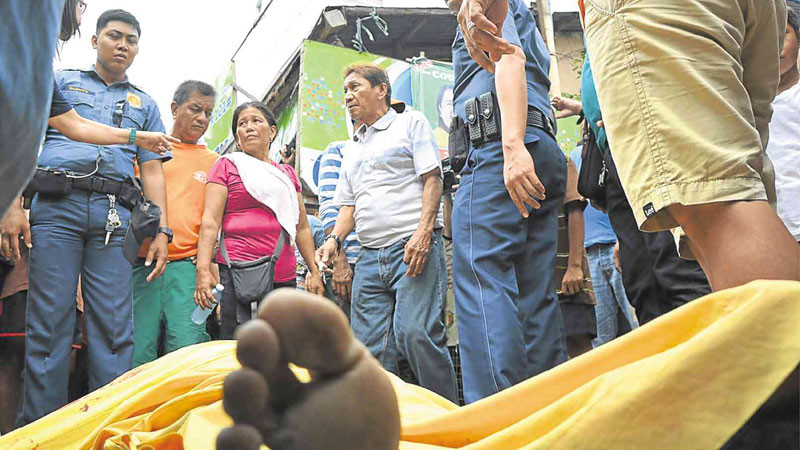
ANOTHER ONE BITES THE DUST Funeral parlor workers lift the body of one of the two drug suspects who were killed in an alleged shootout with police in Barangay Bonuan Tondaligan in Dagupan City on Monday. RAY B.ZAMBRANO/INQUIRER NORTHERN LUZON
There is as yet no single accepted figure or estimate for the number of suspected criminals killed by police forces since President Duterte took his oath on June 30, less than a week ago, but everyone will agree that it must run to dozens.
Reuters, the news agency, reported that 30 suspected “drug dealers” were killed, citing “police” sources. But only one police source was cited in the report, and he specified only one encounter between the police and suspected drug dealers: Sunday, in Manila, with five suspects killed.
The ABS-CBN network reported that 29 “drug and robbery suspects” have been killed in Bulacan province alone since June 30.
Al Jazeera estimates the total number of suspects killed since the presidential inauguration at “at least 45,” citing “authorities.”
For our part, the Inquirer estimates that “at least 23 drug suspects have been killed since the inauguration of Mr. Duterte on June 30.” We are double-checking the details again, and will begin to publish a regularly updated list soon.
If we include the number of suspected criminals who were killed after May 9, Election Day, the estimate may run to as high as a hundred. Again, it depends on who’s counting, and what the count is based on.
The Inquirer report noted that, based on Philippine National Police records, “25 drug suspects were killed in police operations across the country from June 16 to 20 alone.” On top of that, some “22 suspected drug-related killings outside police operations were also reported from May 14 to June 30.”
The killing spree since the oath-taking, by the Inquirer’s initial reckoning, has taken the lives of the following:
On July 1, an alleged drug peddler in Caloocan City and a former policeman allegedly serving in his employ were killed in a gun battle.
On July 3, eight alleged drug dealers in Manila were killed, including the five cited in the Reuters report. These five suspects were killed in what the police called a “follow-up antidrug operation.” The three others killed were a pair of drug pushers found dead, and an alleged drug dealer shot by a policeman.
On those same three days, 13 suspected drug traders were killed in Quezon province.
It may be that all these suspects were in fact involved in illegal drugs; that whether the estimate is 23 since June 30 or 100 since May 9, all those killed were criminals, trading in dangerous and illegal substances that warp minds and sap societies. It may be that all of them deserved to be in jail. But the pattern of their deaths, as well as the evidence reported to have been found after their deaths, suggests that justice is being ill-served.
Many of us will recognize the pattern of the killings: Either there is an encounter, with the police finding themselves in a gun battle with the suspects; or there is an arrest, and the suspect then tries to grab the arresting officer’s gun.
What is noteworthy is that, in all these encounters, in which several dozen suspects perished, no policeman has been slain; not one has been wounded.
What explains these killings? Are the drug dealers and pushers, growing desperate under mounting police pressure, being forced into the open, and into shoot-outs they provoke but cannot win? That is an effective if messy strategy. But what if the police officials involved in the illegal drugs business are only removing “assets” and “evidence” as fast as they can, before President Duterte takes full control of the police?
What is worrying is that it was only yesterday when the President finally named the active and recently retired police generals allegedly involved in illegal drugs. This means that the second possibility—of corrupt police officials clearing the decks—remains disturbingly valid.
But what should concern us, even those who support the Duterte administration’s anticrime and anticorruption policies to the full, is that these killings are exactly the kind of shortcuts that dampen criminality for a time, before it comes roaring back to life. Why? Because when guns are what determines justice, the criminals can simply purchase more firepower in the future.